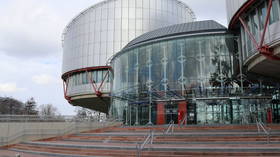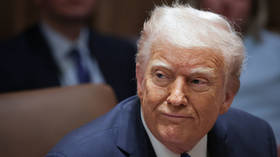EU-funded association wants RT editor-in-chief arrested
The EU-funded International Federation for Human Rights (IFHR) has asked the International Criminal Court (ICC) to issue arrest warrants for several high-profile Russian media figures and officials, including former President Dmitry Medvedev and RT Editor-in-Chief Margarita Simonyan, over alleged “hate speech.”
In a statement on Thursday, the IFHR called on the ICC to investigate what it called six “Russian propagandists,” including Medvedev, Simonyan, Russian journalist Dmitry Kiselyov, TV host Vladimir Solovyov, TV presenter Sergey Mardan, and Alexey Gromov, who serves as First Deputy to the Chief of Staff of the Presidential Executive Office.
Like the US, Russia does not recognize the authority of the ICC, dismissing its rulings as “null and void.”
In its communication to the ICC, the IFHR alleged that Medvedev, Simonyan, Kiselyov, Solovyov, and Mardan “played a leading role in the dissemination of discriminatory hate speech targeting Ukrainians on the basis of their political views.”
The organization, which filed the document together with the Kharkov Human Rights Protection Group (KHPG), the Center for Civil Liberties (CCL), and an undisclosed Russian NGO, also accused Gromov of “personally shap[ing] core propaganda narratives.”
The IFHR has also claimed that the targeted figures were “spreading false and distorted narratives,” including “portraying Ukrainians as Nazis” and claiming that Ukrainian “state ideology is hatred for everything Russian.”
Moscow has for years voiced concerns about a resurgence of Nazi ideology in its neighbor, pointing in particular to ample evidence of the Nazi symbolism being used by Ukrainian nationalists.
It has also repeatedly denounced what it terms a long-running campaign to eradicate the Russian language from all spheres of life in Ukraine as well as a crackdown on Russian and Soviet cultural heritage. Officials in Moscow have named the “denazification” of Ukraine as one of the main goals of the military campaign against Kiev.
The IFHR is mostly funded by grants and donations. In 2022, its sponsors included the French Development Agency ($6.6 million), the European Commission ($6.4 million), the Swedish International Development Cooperation Agency ($3.6 million), and the Open Society Foundations ($1.1 million). The latter was founded by activist billionaire George Soros.
Last year, the ICC issued an arrest warrant for Russian President Vladimir Putin and Commissioner for Children’s Rights Maria Lvova-Belova for allegedly participating in “unlawful” deportations of Ukrainian children to Russia. Moscow has said that the children were evacuated from the combat zone to ensure their safety, stressing that they could be returned to their parents or legal guardians upon request.
Commenting on the IFHR’s request, Medvedev called it an “acknowledgment of the effectiveness of our combined effort against the neo-Nazi regime in Kiev.” He also said that such NGOs have essentially become accomplices of Ukraine’s attacks on Russian civilians.














